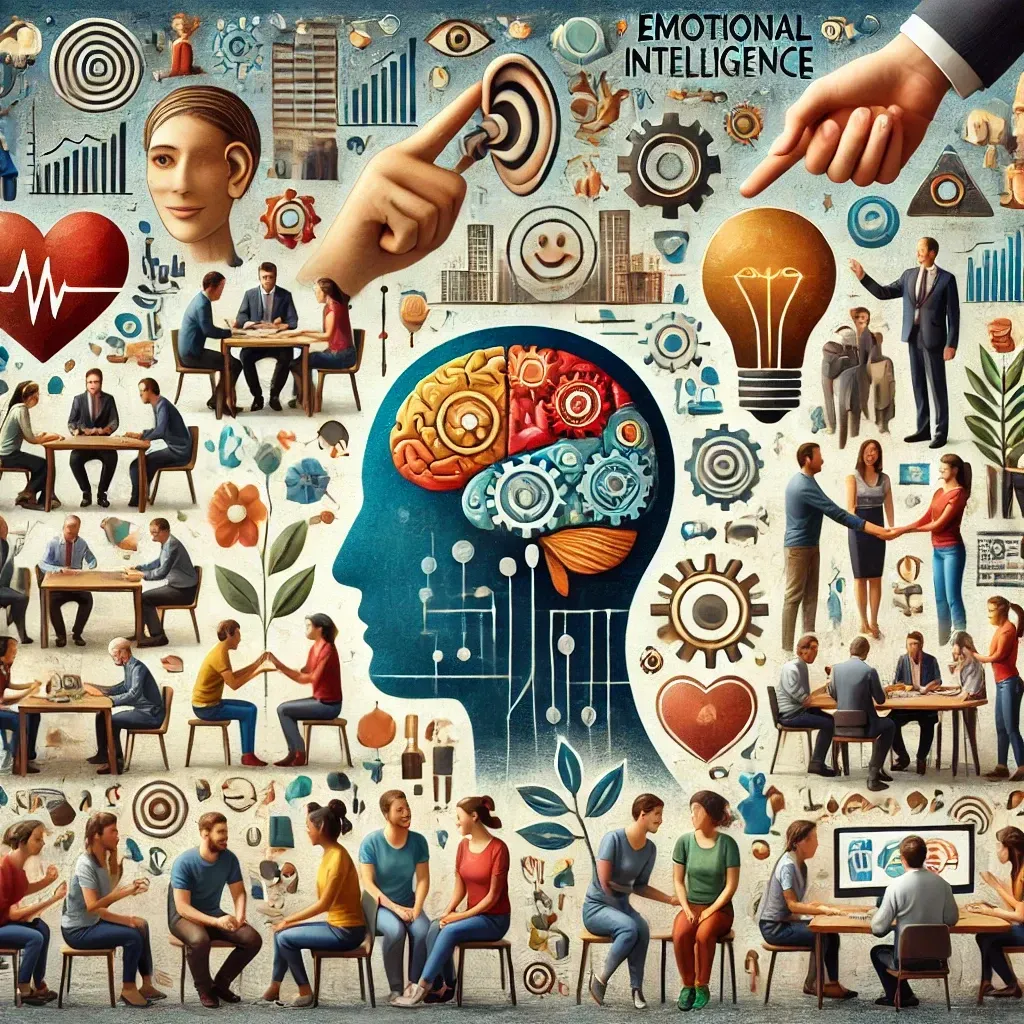Emotional Intelligence: The Key to Personal and Professional Success in 2024

Introduction
Emotional intelligence (EI) is now widely regarded as one of the key components to success both in personal and professional domains, in our fast-paced world today. But what does it all mean, and why is being in touch with our feelings so critical to the pursuit of happiness? We are going to explore what emotional intelligence is, its components of, and how you can build and use your EI for a host of reasons in this massive guide on Emotional Intelligence.
Ok, So What is Emotional Intelligence?
Emotional Intelligence as a concept
EI (short for emotional intelligence) also known as EQ [emotional quotient] refers to our ability to perceive, understand, and manage other emotions. IQ measures cognitive abilities while EQ is all about your emotional and social skills.
Emotional Intelligence Elements
Why Emotional Intelligence Matters
Emotional intelligence is not just a buzzword but a skill set that can have an impact on different aspects of your life. So, here is a list of reasons why EI matters:
Personal Relationships
You will be able to navigate the nuances of personal relationships by understanding and interpreting emotional intelligence. From family to friends and from relationships with partners, a high EQ will allow you to communicate better, resolve conflicts more graciously, and build stronger meaningful connections.
Professional Success
Emotional intelligence is the big thing in today’s workplace Leadership skills are reinforced, team spirit is enhanced and job performance in general improves. Many employers even nowadays have started to place higher value on EQ over IQ; simply because employees with high emotional intelligence usually make more adaptable, resilient, and collaborative individuals.
Mental Health
A study with better mental health states that those who exhibit higher levels of emotional intelligence suffer less depression, anxiety and are better able to manage their moods. You can also lower your stress, anxiety and depression by understanding and controlling these emotions.
Emotional intelligence is a learned skill.
Answer Key: How to Boost Your Emotional Intelligence (H1)
The good news: Emotional intelligence can be developed and improved. Boosting your EQ – Some Actionable Tips

Practice Self-Awareness
It all starts by being aware of you feelings. You can get a journal and write down when you feel things to start connecting the dots. Performing this exercise will allow you to do more of the above: noticing your emotionally patterns.
Develop Your Self-Control Skills
Learn to control your emotions in a helpful way. These ways could be deep breathing, meditating or simply being mindful in a given situation keeping you calm and optimal.
Cultivate Empathy
Empathy is the capacity to understand another’s feelings or experience. Try to hear the other person out, and place yourself into their shoes. This will help you build a lot stronger connection with others.
Cultivate Social Competences
Solid social skills come down to good communication, conflict resolution and an effective team. Get engaged in team activities and get feedback this will help you to improve interpersonal skills.
Stay Motivated
Set specific targets and stick with it Find a purpose to live, and don’t let it die. Surround yourself with people who motivate you, and remember all your achieved goals to keep pushing on.
Why Leadership And Emotional Intelligence
Leadership emotional intelligence
Emotional Intelligence: Leaders with great emotional intelligence are better able to build and lead an effective team that can help them reach organizational goals. Here’s why:
Better Communication
A wise leader communicates well. The communication culture becomes far more open and honest; they know, through experience but also by understanding their own emotions behind what was said and that of other team members as well.
Greater Team Communication
When leaders have high EQ, they inspire trust and respect. They build a safe space for people to feel appreciated and listened to which in turn increases teamwork.
Conflict Resolution
Leaders who have emotional intelligence EMOTIONALLY INTELLIGENT handle conflicts with empathy and understanding. Issues are addressed fairly and with due haste so that everyone feels heard.
Enhanced Employee Engagement
Employees feel inspired by leaders who show emotional intelligence. They understand the work of their team and in turn, have a stronger engagement level that ultimately increases job satisfaction.
Applying Emotional Intelligence in Real Life
In Daily Lives Emotionally Realistic
Emotional intelligence is not just for the workspace – it is a life skill. Some common situations in which EI matters include
Parenting
Parents who are in tune with their children’s feelings and respond to them calmly. By using this method, it nurtures an environment that is safe and enhances empathetic growth.
Friendships
Emotional intelligence counts in the way of listening, being supportive, and dealing with conflict within friendships. It helps in strengthening the bond or trust between friends.
Romantic Relationships
Romantic Relationship It boosts our relationships through communication, understanding, and emotional connection. Encourages partners to face problems boldly and advantages them in the journey of their marriage.
Self-Care
Another aspect of emotional intelligence is self-care. Recognize when have too much and take a break, do you need company to relax or alone time with coffee in Starbucks Participating in activities that are restful for your soul.
4 Myths of Emotional Intelligence
How to Debunk Myths of Emotional Intelligence
Myth: Five things you have wrong about emotional intelligence
EQ vs. IQ
Emotional intelligence is, according to some people, more crucial than IQ. Last but not least, both are important and they help each other out in reality. A high IQ can solve complex issues, and a heightened EQ helps one with the social equations of life.
Emotional Intelligence Hypothesis H2: Emotional intelligence is stable
Emotional intelligence is something that, unlike IQ, which cannot be changed as much throughout life can adapt with practice and effort.
H2) Emotional Intelligence is all about being nice.
Empathy and kindness are important components of emotional intelligence (handling your emotions, setting boundaries, making hard decisions as necessary…).
The Future of EQ
As one of my favorite bloggers, Josh Belk wrote in his article Stop Focusing Extraordinarily High On Your IQ When Emotional Intelligence Is Key – The Honey Spec Link you might think the same way as me, H1: Emotionally Intelligent Economists.
With the way that globalization has impacted and continues to change this world into a much smaller more diverse place, its only proper carrier; emotional intelligence remains in demand. And here is how EI pans out in the future.
Emotional Intelligence in Education
An increasing number of schools are realizing this and trying to incorporate it as a must, next to mathematics or English. Teaching children to have Emotional Intelligence can help them perform better at school and engage in healthier social dynamics.
The Role of Equal Emotional Intelligence for Others in Technology
Algorithms and robots may increasingly take on repetitive tasks, but human capabilities like empathy (emotional intelligence) will remain indispensable. The latter will result in a surge of job opportunities requiring empathetic, creative or interpersonal skills.
Emotional Intelligence in the Era of Globalization
As our world continues to grow more globalized, the need for emotional intelligence between different cultures will be ever so important in cross-cultural communication and collaboration. The ability to grasp as well value differing opinions is critical in developing good international camaraderie.
Conclusion
Being emotionally intelligent is an a-game skill that will improve every area of your life. You will also be able to enhance your personal relationships, professional effectiveness, and mental health by mastering the key emotional competencies in self-awareness, self-regulation, empathy, motivation, and social skills. Emotional intelligence is only going to get more significant with time as we enter new generations study this skill now it is a required competency for all.
FAQs
A1 – Can You Teach Emotional Intelligence?
The good news is, that emotional intelligence can be learned and practiced by training the mind. Some of them are mindfulness, exercises to practice empathy, and communication skills that can contribute a lot in leveling up your EQ.
A2: How do I test my emotional intelligence
There are multiple quizzes available online, which you can use to test your EQ. There are a few Emotional Intelligence tests out there, some of the popular ones include: Emotional Intelligence Appraisal and MSCEIT (Mayer-Salovey-Caruso Emotion Intelligence Test).
Is The Emotional Intelligence Then More Important Than IQ?
In both cases being high in emotional intelligence and having an average IQ help IQ may help you solve complex problems, all logical and scientific sort of stuff but EQ is equally important for dealing with your own emotions, and building relationships rather than thriving in those cultural environments.
Ce: Tackling Mental Health with EQ
Right – but a high EQ also means you will be better able to handle stress, deal with anxiety, and build healthier relationships. It advocates a healthy, full life!
Q5: How Leadership is Influenced by Emotional Intelligence
Emotionally intelligent leaders make good communicators, have empathy, and can manage team conflict. This leads to greater employee engagement and enhanced organizational results as they inspire and energize their teams.
In this guide, you will discover everything about emotional intelligence – why it matters, how to develop it, and its role in your life. The more you work to build strong emotional intelligence characteristics, the more likely it becomes that your own success – both personal and professional – will follow.


